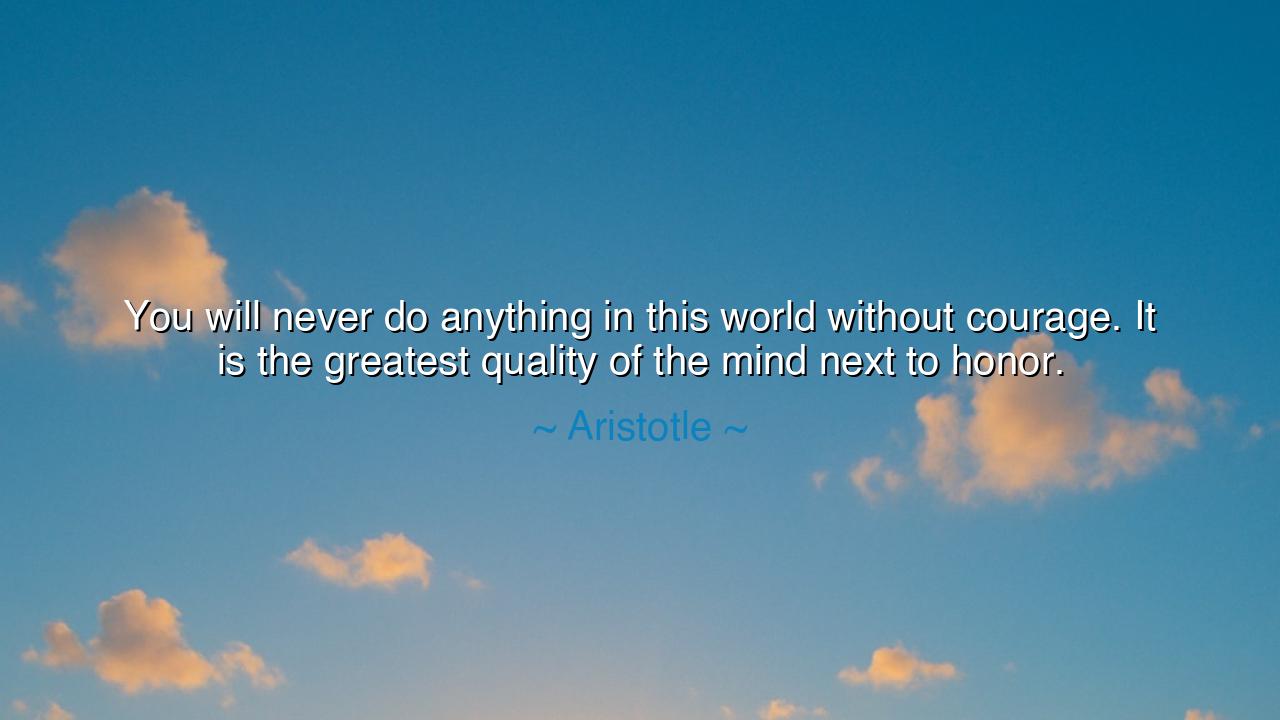
You will never do anything in this world without courage. It is
You will never do anything in this world without courage. It is the greatest quality of the mind next to honor.






In the immortal wisdom of Aristotle, the philosopher of balance and virtue, we find one of the most powerful truths ever spoken: “You will never do anything in this world without courage. It is the greatest quality of the mind next to honor.” These words, though born in the age of ancient Greece, shine like an eternal flame across all generations. For Aristotle, courage was not merely the bravery of warriors upon the battlefield — it was the foundation of all human achievement. Without it, knowledge lies unused, justice remains unspoken, and dreams wither before they are ever born. Courage is the spark that turns thought into action, and honor is the light that keeps that fire pure.
To understand the heart of Aristotle’s teaching, we must first remember his vision of virtue. He taught that every human soul seeks the good, and that happiness — true happiness, not fleeting pleasure — is found in living with excellence. But excellence demands choice, and every choice demands courage. The coward knows what is right but lacks the strength to pursue it. The rash man acts without wisdom and destroys what he could have built. But the courageous man stands between these extremes — steady, clear, and unshaken. In this balance, Aristotle saw the harmony of the soul, the very essence of human greatness.
Courage, he tells us, is the gate through which all other virtues must pass. For how can one be just, if one fears the judgment of men? How can one be wise, if one trembles before truth? How can one be compassionate, if one fears the pain of another’s suffering? It is courage that makes honor, wisdom, and kindness possible — the still, unwavering force that allows the spirit to rise above fear. In this sense, courage is not the absence of fear, but the mastery of it — the art of acting rightly even while the heart trembles.
Consider the story of Socrates, Aristotle’s teacher and the moral titan of Athens. When false accusations were brought against him, and the court of men demanded his silence or death, Socrates refused to betray his truth. Though he could have fled, he chose to drink the cup of hemlock rather than deny his conscience. His courage was not violent or loud, but calm and radiant, born from honor. Through his death, he taught the world that the fearless pursuit of truth is greater than the fear of death itself. In this moment, he embodied Aristotle’s wisdom: that without courage, the mind’s greatness cannot live, and without honor, courage becomes hollow pride.
Throughout history, this union of courage and honor has been the mark of humanity’s noblest souls. Think of Rosa Parks, who, in a single quiet act of defiance, refused to give up her seat on a Montgomery bus. She did not shout or threaten — she simply stood firm in dignity. In her, we see Aristotle’s truth: that courage is not always found in grand battles, but often in silent moments of moral resolve. Her action, guided by honor, set into motion a wave of change that redefined justice for generations. In her steadiness, we find the living spirit of the ancients — that the greatest power lies in standing firm for what is right, no matter the cost.
Aristotle’s words also remind us that courage is not only an outer act, but an inner discipline. To live with courage is to face oneself — to confront doubt, failure, and fear without surrender. It is the student daring to think differently, the artist daring to create what the world has not yet seen, the soul daring to love even after being broken. In every act of life, whether public or private, the mind must summon courage to move forward, and honor to ensure that its motion serves the good. Together, these two virtues forge the unbreakable character of a life well-lived.
But Aristotle does not promise that courage will make the path easy — only that it will make the path meaningful. Those who live by courage and honor may suffer losses, yet they never lose themselves. For the coward dies many times before death, but the courageous live fully in every moment. The world rewards comfort, but history remembers the brave. Thus, to live without courage is to leave one’s purpose unfulfilled — to wander forever in the shadow of fear.
So, let this be the lesson carried forth to all who would live nobly: nurture courage, guard honor, and act with the strength of truth. Do not wait for fear to vanish — it never will. Step forward despite it. Speak even when your voice trembles. Choose what is right, though it costs you ease. For the soul that lives in courage becomes unshakable, and the life that is guided by honor becomes immortal in memory. As Aristotle taught, nothing great is born without courage — and nothing pure endures without honor. Let these two stand as the twin pillars of your life, and the world, through you, will be made greater.






AAdministratorAdministrator
Welcome, honored guests. Please leave a comment, we will respond soon